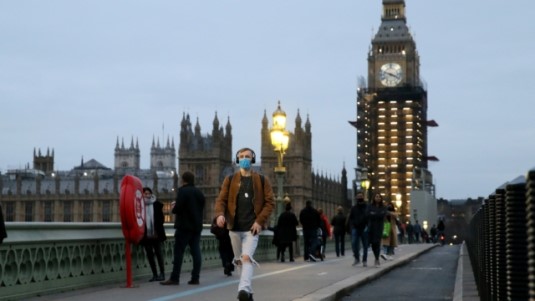The Tory Class Politics of Covid

Unfortunately, because of the government's handling of the pandemic we've become inured to the stop-start cycle now. The irreversible freedom Boris Johnson declared back in July was just a prelude to future restrictions. The public, always well ahead of the government on Covid avoidance, would dig in for another round of not seeing anyone and not going anywhere. Polling ahead of last week's Commons vote on mask mandates and covid certification found 58% of respondents supported everything that was proposed. Masking up in shops enjoys strong support, and over half support a fortnight-long lockdown over Christmas to stymie the variant's spread.
Meanwhile, the government are content to sit on its hands. After a week of record rises in infection, once more SAGE's advice to act quickly to prevent the problem from getting worse finds itself brushed aside. More dithering brought on by political reasoning - resistance in the cabinet from superspreader Sunak, and threats of unrest in the parliamentary party. If the Commons returns in late December to approve another round of emergency measures, Johnson's authority is set for a battering as the promised backbench rebellion means he's forced to rely on Keir Starmer. Again.
This cycle of opening up and shutting down did not have to happen. These are the fruits of very deliberate choices the Tories made about what their priorities were during the pandemic. As the labour movement left have approached the crisis with our class interests in mind, so the Tories have done so with theirs. The decision to keep schools open was not a concern for children's mental health, but ensuring their parents could go to work if required. Allowing students back to universities just as infections were on an upward trajectory had more to do with serving the rental interests and property speculators dependent on them for income than securing the "student experience". Raising and then cutting Universal Credit was an effort at ensuring social security was an unpalatable option for riding out the pandemic. Tying the Job Retention Scheme to employers on reduced wage payments kept businesses and workers on life support, but it had to be ended as quickly as practicable to avoid the risk of raising expectations about what else the state could do. Combined with inadequate sick pay, both acted together to affirm our collective dependence on the wage relation as the primary means of making a living. Even Sunak's preference to borrow by issuing gilts instead of getting the Bank of England to stump up the reddies was a class conscious move: increasing the debt now means the state would, down the line, have to pay it back, which is amenable to future Tory austerity politics and disciplining an incoming Labour government. Taking these in the round, it's easy to see why the Tories have put all their hopes in the vaccine basket: it doesn't raise political horizons, and it doesn't suggest alternative ways of doing things are possible. Their boom and bust public health policy is driven entirely by their defence of class relationships, as per the rest of their politics.
Except now, Johnson's barefaced lies have caught him out, which have severely damaged his standing and ability to bounce back. But should he be replaced while the pandemic rages, their public health strategy will be more of the same: relaxation of the rules, and then ramping up as a new infectious wave hits.